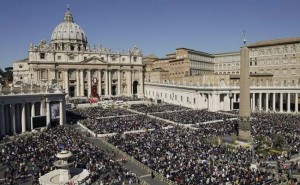Do the Catholic Church’s Teachings on Mary Constitute Authentic Christian Doctrine?
James White debates Peter D. Williams at the London Oratory in St. Wilfrid’s Hall.

Dr. James White:
Why is the Reformation still important? Why is it proper for us to focus upon it this year in celebration of 500 years? Why do I pray that by the end of 2017 more and more of God’s people will embrace the Reformation, and Reformed theology as a whole? Well, here is a tweet from the current Pope. He encourages Roman Catholics to “entrust the new year to Mary.” Doing this, evidently, will result in “peace and mercy” growing throughout the world. And here I thought that could only happen as men and women bow the knee not to Mary, but to the Lord Jesus, in repentance and faith, trusting in His once-for-all work upon the cross as the perfect Savior. Rome’s departure from the Gospel remains complete, and defiant. She continues to blaspheme the cross every time a man-made “priest” pretends to “re-present” the once-for-all sacrifice of Calvary upon a Roman altar. And she continues to enslave men with her endless gospel of sacraments and penances, which can never bring them peace. And in this tweet the Pope demonstrates once again the grossly idolatrous nature of modern Roman teaching concerning Mary.
How many non-Roman Catholics today understand why they do not bow the knee to Rome? In what is loosely called Evangelicalism, very few. One either has the wild-eyed bigotry of the Jack Chick variety anti-Catholicism, or the luke-warm “it’s just a matter of taste” variety of synergistic Tiber-paddling that is so common today. May the number of those who knowingly, and out of a true commitment to sound biblical doctrine, reject Rome’s pretensions, grow in this the 500th anniversary of the Reformation.
 Dr. Sam Storms – “10 things you should know about what the Roman Catholic Church believes about Mary” – article (original source here)
Dr. Sam Storms – “10 things you should know about what the Roman Catholic Church believes about Mary” – article (original source here)
In our continuing series on 10 things every Christian should know, we turn our attention to the Roman Catholic Church and its beliefs about the Virgin Mary.
(1) Rome believes that when Mary was conceived in the womb of her mother she was preserved and protected from the taint of original sin. This is the doctrine of the Immaculate Conception of Mary. This dogma was proclaimed by Pope Pius IX on Dec. 8, 1854. We read this in the Catholic Catechism:
“Through the centuries the Church has become ever more aware that Mary, ‘full of grace’ through God, was redeemed from the moment of her conception. That is what the dogma of the Immaculate Conception confesses, as Pope Pius IX proclaimed in 1854 – ‘The most Blessed Virgin Mary was, from the first moment of her conception, by a singular grace and privilege of almighty God and by virtue of the merits of Jesus Christ, Savior of the human race, preserved immune from all stain of original sin” (CC, 491).
(2) The RCC also teaches that “in consequence of a Special Privilege of Grace from God, Mary was free from every personal sin during her whole life” (Fundamentals of Catholic Dogma, p. 203; this view was endorsed by Augustine). Again, the Catechism declares that “By the grace of God Mary remained free of every personal sin her whole life long” (CC, 493).
(3) Rome also believes in the perpetual virginity of Mary. The dogma of the perpetual virginity of Mary was proclaimed by the Council of Trent in 1545-63. The Catechism affirms the following:
“The deepening of faith in the virginal motherhood led the Church to confess Mary’s real and perpetual virginity even in the act of giving birth to the Son of God made man. In fact, Christ’s birth ‘did not diminish his mother’s virginal integrity but sanctified it.’ And so the liturgy of the Church celebrates Mary as Aeiparthenos, the ‘Ever-virgin’” (CC, 499).
(4) When Protestants object to Mary’s perpetual virginity by pointing to those texts that refer to the brothers and sisters of Jesus (Mt. 12:46-50; 13:55-56; Mark 6:3; John 2:12; 7:1-5,10; Acts 1:14; 1 Cor. 9:5; Gal. 1:19), Rome responds in this way: Continue reading